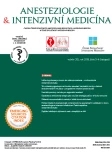The View of Anaesthesiology and Intensive Medicine Trainees on Specialty Education in the Czech Republic: Questionnaire Study
Authors:
M. Klincová 1,6; A. Trčková 1,6; J. Chlupová 2,6; O.- Jor 3 6; E. Klabusayová 1,6
Authors‘ workplace:
Klinika dětské anesteziologie a resuscitace, Fakultní nemocnice Brno a Lékařská fakulta Masarykovy univerzity
1; Klinika anesteziologie, resuscitace a intenzivní medicíny, Fakultní nemocnice Brno a Lékařská fakulta Masarykovy univerzity
2; Klinika anesteziologie, resuscitace a intenzivní medicíny, Fakultní nemocnice Ostrava a Lékařská fakulta, Ostravská univerzita
3; Katedra intenzivní medicíny a forenzních oborů, Lékařská fakulta, Ostravská univerzita
4; Klinika anesteziologie, resuscitace a intenzivní medicíny, Lékařská fakulta v Hradci Králové, Univerzita Karlova
5; Sekce Mladých anesteziologů České společnosti anesteziologie, resuscitace a intenzivní medicíny České lékařské společnosti Jana Evangelisty Purkyně
6
Published in:
Anest. intenziv. Med., 30, 2019, č. 3-4, s. 162-169
Category:
Overview
Goal: So far there have been no data describing specialization education from the perspective of the trainee doctors in preparation for specialty examinations. The aim of the questionnaire study was to learn about the opinions and experience of trainee doctors with pre-exam education in the specialty of Anaesthesiology and Intensive Medicine.
Type of study: Survey
Materials and methods: The target group was AIM doctors in specialized training up to 35 years of age. They were addressed personally at educational events, electronically via Facebook or through their educational leads. Data collection took place between 09/2017 and 09/2018. The results were evaluated using descriptive statistics (MS Excel).
Results: In the period of 09/2017–09/2018, a total of 244 physicians participated in the event. Nearly 90% of respondents knew the identity of their educational lead. 54% of the respondents admitted that they did not entirely complete the scope of the pre-exam preparation according to the educational program of Anaesthesiology and Intensive Medicine, breaking down as 50% of trainee doctors from university hospitals, 52% from regional hospitals, 60% from district hospitals and 67% of trainee doctors from municipal or other hospitals.
Conclusion: Despite the limitations of the scope of the questionnaire, it is clear that the doctors in training are not indifferent to the conditions for obtaining the specialty examinations, and that the study can serve as a good stepping stone for further improvement of AIM training conditions.
Keywords:
questionnaire – educational programme – trainees – preparation for specialty examinations – educational conditions – survey
Sources
1. Veselá L. Lékaři hodnotí svá pracoviště. Má to pomoci hlavně těm mladým si vybírat. Portál idnes.cz [online]. 2019 [cit. 2019-4-25]. Dostupné z: https://www.idnes.cz/zpravy/domaci/zdravotnictvi-clk-pracoviste-nemocnice-lekari-doktori.A190124_134015_domaci_linv
2. Veselá L. Každý pátý medik plánuje pracovat v cizině, odhalil průzkum. Portál idnes.cz [online]. 2019 [cit. 2019-4-25]. Dostupné z: https://www.idnes.cz/zpravy/domaci/zdravotnictvi-lekari-medici-zdravotnictvi-nedostatek-lekaru.A190410_123108_domaci_linv
3. Hilšerová M. Výsledky průzkumu Sekce mladých lékařů ČLK. Tempus Medicorum. 2017;26 : 5–7.
4. Představenstvo České lékařské komory. Stavovský předpis České lékařské komory č. 22. 2017. Portál juniordoctor.cz [online]. 2017 [cit. 2019-7-24]. Dostupné z: http://www.juniordoctor.cz/stanovy
5. Drábková J. Statistika oboru anesteziologie a intenzivní medicína – A 025. Anesteziol intenziv Med. 2018;29 : 305–308.
6. Lékaři, zubní lékaři a farmaceuti 2013. 1. vyd. Praha: ÚZIS ČR; 2014. ISSN: 1214-9888.
7. Fernandesa DS, Teixeirab L, Longrois D, et al. The main concerns of European anaesthesiology postgraduate trainees: A European survey. Trends Anaesth Crit Care. 2018;18 : 3–9
8. Mitre C, Breazu C, Mitre I, Filipescu D. Migration of skilled anaesthesiologists from low to high-income economies: Urgent action needed. Eur J Anaesthesiol. 2016;33 : 157–159.
9. Lukáš P, Pražák J, Chramosta P, Mixa V. Plnění a splnitelnost úkonů požadovaných ve specializačním vzdělávání oboru Anesteziologie a resuscitace. In Ševčík P, et al. Sborník Abstrakt. XIV. Národní kongres ČSARIM. 2007. Praha: Galén; 2007 : 113.
10. Česká chirurgická společnost. Sekce hrudní chirurgie. Portál chirurgie.cz [online]. 2019 [cit. 2019-7-24]. Dostupné z:https://www.chirurgie.cz/sekce-spolecnosti/sekce-hrudni-chirurgie/
11. Valeanu L, Stefan M, Fernandes DS, et al. Anaesthesiology trainees and their needs: a Romanian perspective. Results from a European survey. Rom J Anaesth Intens Care. 2018;25 : 37–42.
Labels
Anaesthesiology, Resuscitation and Inten Intensive Care MedicineArticle was published in
Anaesthesiology and Intensive Care Medicine

2019 Issue 3-4
-
All articles in this issue
- Obtížné zajištění dýchacích cest u dospělých a u dětí; nový doporučený postup ČSARIM
- POCT – UZ v diagnostice diafragmatické dysfunkce po torakochirurgických výkonech
- Jak pracovat s Doporučeným postupem ČSARIM pro zajištění obtížných dýchacích cest?
- APACHE a qSOFA ve stratifikaci rizika při sepsi
- Management of hypotension after general anaesthesia induction - multicenter questionnaire study
- Takotsubo syndrome during thoracic spinal surgery. Case report
- The impact of videolaryngoscopy on the depth of endotracheal tube placement and the rate of unintended endobronchial intubation – a prospective randomized study
- ARDS a obézní pacient
- The neck fascia plane for regional anesthesiology
- De-escalation of antibiotic therapy as a part of care strategy about critically ill patients
- TTM – řízená tělesná teplota v současném pojetí
- Basic neuromodulation methods in chronic pain management
- Ambulantní kolonoskopie – čas propuštění po výkonu
- The View of Anaesthesiology and Intensive Medicine Trainees on Specialty Education in the Czech Republic: Questionnaire Study
- Tako-tsubo kardiomyopatie jako perioperační komplikace karotické endarterektomie potvrzená MR zobrazením srdce
- Zajištění obtížných dýchacích cest u dospělých a dětí
- EKG lekce 5
- Farmakologie látek ovlivňujících fluidokoagulační rovnováhu
- Kapilární návrat – klinické vyšetření přítomnosti cirkulační koherence?
- Za primářem MUDr. Vladimírem Kynclem (19. 10. 1930 – 27. 5. 2019)
- Anaesthesiology and Intensive Care Medicine
- Journal archive
- Current issue
- About the journal
Most read in this issue
- Kapilární návrat – klinické vyšetření přítomnosti cirkulační koherence?
- Basic neuromodulation methods in chronic pain management
- De-escalation of antibiotic therapy as a part of care strategy about critically ill patients
- Zajištění obtížných dýchacích cest u dospělých a dětí
